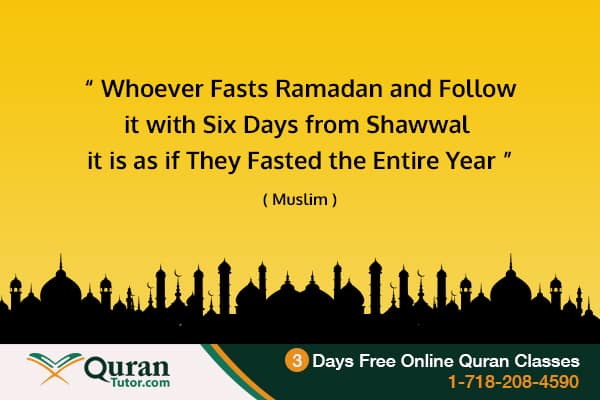Virtues of The Month Shawal and Fasting 6 Days
It is the wish of every Muslim that he or she receives as much Ramadan in his or her life possible. When Ramadan is available to them, their prime focus is on worshiping and praying in this month as much as possible so that they attain and gain maximum mercy and blessings from Allah. Besides focus on prayers and good deeds in Ramadan, there is another thing which Muslims eye and that is the arrival of the month of Shawal.

The month of Shawal is primarily known for the festival of Eid that takes place on the first day of this month. However, there are very few people who are familiar with the fact that this month instead of marking an end to Ramadan can actually help carry on the blessings and mercy associated with Ramadan. Moreover, the month also holds importance in the history of Islam as well. The lines below discuss the fasting in the month of Shawal along with the historical significance of the month.
Six Fasts In Shawal:
For ordinary and common people fasting is limitied to the month of Ramadan and once Ramadan ends for them it is the end of fasting till the next time. However, there are other people who want to remain in the trance created in the month of Ramadan and wish to carry it forward. For such people the month of Shawal is an excellent opportunity to get their hands on maximum reward possible. People who know keep six fasts in the month of Shawal to ensure greater reward. This keeping of six fasts is proven from hadiths of Prophet (PBUH) which are discussed below.
Prophet (PBUH) said:
“Whoever fasts Ramadan and follow it with six days from Shawwal it is as if they fasted the entire year.” (Muslim)
From the hadith it is clear that those who keep six fasts in Shawal along with the previous fasts of Ramadan receive a reward equal to fasting a whole year. However, the thing to consider pertaining to this hadith is that the fasts of Ramadan are the obligatory fasts with their set reward, it is until they are complemented with Shawal fasts that they lead to reward equal to a year’s fasting. Similarly, the fasts of the month of Shawal are Nafli fasts and they have their individual reward, but if they are not complemented with the obligatory fasts of Ramadan then one does not get the one-year fasting reward.
The reward of fasting in Shawal is not limited to fasting only; rather the reward is extended to every good deed performed in the state of fasting in Shawal. In this regard, Prophet Muhammad (PBUH) said in One of His hadiths:
“Whoever fasts Ramadan and then six days after Eid, it is an entire year. Whoever does a good deed shall have ten times its reward.” (Ibn Majah)
Therefore, the fasting in Shawal helps in gaining reward for the rest of the year and in addition to the fasting reward, the good deeds performed during the fasting days also help gain ten times the reward for those deeds as well.
Recommended Reading - Fasting in the light of Quran and Sunnah of Hadrat Muhammad (PBUH)
Historical Importance:
In addition to being a month of great virtue and blessings, the month of Shawal holds great importance in the Islamic history as well. There are different events that took place in the month of Shawal in addition to the birth of some renowned Muslim personalities. The lines below give some major mentions.
Ghazwa Uhd – The battle of Uhd was the second Battle in which Prophet Muhammad (PBUH) participated. In this battle it was Muslims who were initially winning, however, they forgot the command of Prophet (PBUH) and came down from the Uhd mountain which resulted in defeat of Muslims.
Hazrat Aisha’s (RA) Birth – Hazrat Aisha (RA) is the wife of Prophet (PBUH) and thus the mother of all the Muslims. She was also born in the month of Shawal. She is one of the renowned wives of Prophet (PBUH) and there is a great number of hadiths that are narrated by Her and She is respected and loved by all the Muslims.
Birth Of Hazrat Hussain (RA) – The grandson of Prophet Muhammad (PBUH) is Hazrat Hussain (RA) who was also born in the month of Shawal. He is an iconic personality among Muslims and in Muslim youth He is known for His bravery and piety.
Death of Abu Talib (RA) – He was the uncle of Prophet Muhammad (PBUH) who took care of Him once His grandfather had passed away. He took care of Him and nourished Him into youth and when Prophet (PBUH) started preaching Islam, he protected Him from those who opposed.
Bottom Line:
In a nutshell, blessings and mercy does not end with Ramadan, rather one could extend the horizon of blessings into the month of Shawal by keeping six fast in it and continue on doing the good deeds that started in Ramadan.









